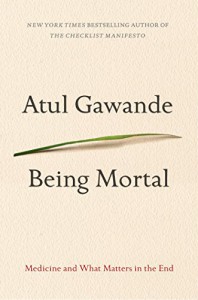Review


Working as I do in an integrated Health & Social Care environment, ostensibly geared to working with older citizens, this book had a resounding resonance with my own professional experience. The loss of my grandparents in recent years also bore some of the hallmarks of the tensions alluded to by Gawande, between the expectations and aspirations of people faced with the additional years, which for many, modern science has made possible and systems which may be subverted towards longevity as a destination in itself, without recourse to the 'quality of life' issues, with which they are inevitably bound.
Gawande makes a very cogent case for considering the role of western medicine in contemporary society and the potential for Drs to collude with patient's assumed desire for survival, because treatments are possible, rather than initiate 'difficult conversations' which establish 'what matters' to the individual. The author describes common examples of clinicians instinctive leaning towards the exhaustion of a catalogue of possible interventions, without necessarily relating decision-making to what the patient is seeking to achieve through treatment. The book may thus be seen as a rallying cry to clinicians to rebalance the power differential which has evolved between the professional and the patient. However, there is also an implied criticism of societies that have become distanced from the reality of death. In the past, families and individuals were arguably more exposed to the experience and consequences of ageing and dying. In contrast to today, when such decline is frequently behind hospital doors, managed by professionals, the sanitizing of the process may have resulted in societies less equipped emotionally and practically to procure and recognize a 'good' death. For example, the author contrasts the experience of many with the often enlightened approach adopted by the hospice movement, which could inform much of 'mainstream' medical 'end-of-life pathways'.
In his quite profound book, Gwawande's sensitive writing style invites overdue reflection on how we have come to the current state of affairs. Given the ageing populations of most western nations, he has also perhaps rendered us a great service, initiating a wake-up call to all of us, to consider how we would want the last stages of our lives to look like (and equally pressing - not look like) and to have the courage to ensure our nearest and dearest are aware of our wishes. Abdicating responsibility for defining a 'good death' in our own terms, potentially leaves the decision-making, when the time comes, in the hapless hands of those without the clarity of 'knowing'. For those of us in a position to initiate such difficult conversations, the reward of short-term discomfort may be surprising responses, but also understanding and knowledge with which to advocate the most appropriate outcome. A really thought-provoking read.
Gawande makes a very cogent case for considering the role of western medicine in contemporary society and the potential for Drs to collude with patient's assumed desire for survival, because treatments are possible, rather than initiate 'difficult conversations' which establish 'what matters' to the individual. The author describes common examples of clinicians instinctive leaning towards the exhaustion of a catalogue of possible interventions, without necessarily relating decision-making to what the patient is seeking to achieve through treatment. The book may thus be seen as a rallying cry to clinicians to rebalance the power differential which has evolved between the professional and the patient. However, there is also an implied criticism of societies that have become distanced from the reality of death. In the past, families and individuals were arguably more exposed to the experience and consequences of ageing and dying. In contrast to today, when such decline is frequently behind hospital doors, managed by professionals, the sanitizing of the process may have resulted in societies less equipped emotionally and practically to procure and recognize a 'good' death. For example, the author contrasts the experience of many with the often enlightened approach adopted by the hospice movement, which could inform much of 'mainstream' medical 'end-of-life pathways'.
In his quite profound book, Gwawande's sensitive writing style invites overdue reflection on how we have come to the current state of affairs. Given the ageing populations of most western nations, he has also perhaps rendered us a great service, initiating a wake-up call to all of us, to consider how we would want the last stages of our lives to look like (and equally pressing - not look like) and to have the courage to ensure our nearest and dearest are aware of our wishes. Abdicating responsibility for defining a 'good death' in our own terms, potentially leaves the decision-making, when the time comes, in the hapless hands of those without the clarity of 'knowing'. For those of us in a position to initiate such difficult conversations, the reward of short-term discomfort may be surprising responses, but also understanding and knowledge with which to advocate the most appropriate outcome. A really thought-provoking read.

 4
4












